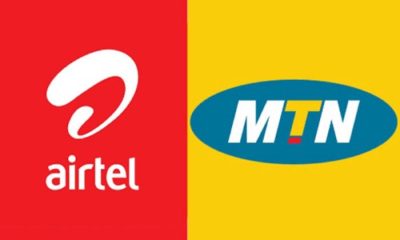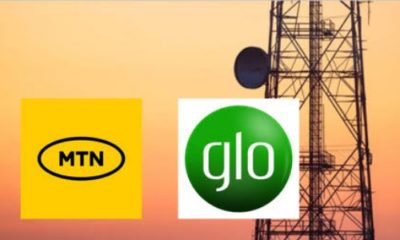Business
Fuel Scarcity: Apprehension grips Nigerians as MTN, Airtel issues 24 hours shutdown ultimatum
…Banks and domestic airline activities disrupted
By Yemie ADEOYE
LAGOS-THE lingering petrol scarcity in Nigeria which is swiftly grinding the economy to a halt seems about to take a new dimension as major mobile telecoms operators in the country have announced a shutdown of operations in 24 hours if the situation is not reversed.
Their counterparts in the banking and aviation sectors have also commenced major disruption of activities due to lack of requisite fuel to power their operations.
 Several Nigerians took to the social media over the weekend to express their apprehension over news making the rounds that MTN and Airtel, two major telecoms operators in the country have started notifying their subscribers of the imminent shutdown within the next 24 hours if the fuel situation remains the same.
Several Nigerians took to the social media over the weekend to express their apprehension over news making the rounds that MTN and Airtel, two major telecoms operators in the country have started notifying their subscribers of the imminent shutdown within the next 24 hours if the fuel situation remains the same.
Reacting to the lingering fuel crises, Airtel said yesterday that the situation was impacting negatively on its commitments to delivering quality services and seamless telephony experience to Nigerians.
“We are currently doing everything within our means, as well as going the extra mile, to ensure that all our base stations and switches are up and running.
“It is sad to note that it is becoming increasingly difficult to replenish current stock of diesel due to the lingering scarcity of the products.
“We are also concerned that, if the situation persists, it may have adverse effects on our network, impacting both voice and data services.
“Airtel, therefore, wishes to assure all customers that we will continue working with all our partners and stakeholders to mitigate any negative impact, as we remain committed to our promise of providing exceptional services just as we seek the cooperation and understanding of all while apologising for any inconvenience at this time.”
Similarly, MTN, Nigeria’s largest mobile telecoms provider has warned that its network faces imminent shutdown due to fuel shortages that have crippled the nation.
“If diesel supplies are not received within the next 24 hours, the network will be seriously degraded and customers will feel the impact,” it added on its Twitter account, @MTNNG, at the weekend.
“Diesel generators power most of MTN’s base stations and switches across the country, but fuel supplies are running low,”
Some Nigerians who responded to our enquiry opined that for the telecoms industry to shutdown would result in dire consequences for the already suffering masses.
Jerry Inyang, a Lagos based lawyer noted on his twitter handle that with the shutdown of every other means of living, the only practical aid that helps people get by in this emergency situation is mobile telephony. “The moment this subscribers shutdown it’s going to be horrendous for millions of Nigerians. Don’t forget that between MTN and Airtel alone they control about 80 million subscribers and this could lead to further discomfort as people will no longer be able to communicate especially during emergencies and that could lead to frustration and chaos.
Already Arik Air and Aero Contractors two leading Airline companies in the country disrupted flight activities for several of their passengers over the weekend as several of their scheduled flights from various airports in the country were suspended, while there are strong indications that their other counterparts have started canceling and suspending flights accordingly due to lack of Jet Fuel.
The Banking sector is not left out as not a few banks have had reason to alert their customer of an imminent shutdown in the next couple of days.
GT Bank, a leading commercial bank in the country has already notified its staff and customers of a 1p.m closure in all its branches with effect from Monday due to fuel scarcity.
Meanwhile, the National Union of Petroleum and Natural Gas Workers, Nupeng, Lagos state chapter has placed the blame of the scarcity at the doorstep of the marketers noting that they appear to have products in their various tank farms, but have suspended loading, hence tanker drivers are unable to load. Tokunbo Korodo, Chairman, Lagos state chapter confirmed this during an interview early Monday morning.
He noted that Nupeng members are not on strike except the NNPC chapter of the union and that their reason was quite different from the ongoing national crises. He affirmed that any marketer who opens its depot would have trucks trooping in with the willingness and readiness to load products.
He also chided Mr. Ifeanyi Ubah for not releasing products before this time, claiming he may have done that for political reasons, as the products capital oil is distributing belongs to the federal government. He assured Nigerians that a major stakeholders meeting has been scheduled for Monday in Abuja with the intentions of finding a lasting solution to the lingering fuel crises.
Business
Savannah Energy Provides Unaudited FY 2024 Trading Updates

Savannah Energy has shared a trading update on its Nigerian operations and other markets in Africa, including up-to-date cash collections in its Nigerian business.
According to the update, made available on Thursday in Lagos, its gross production in Nigeria averaged 23.1 Kboepd for FY 2024, broadly in line with the prior year’s 23.6 Kboepd, of which 88% was gas (FY 2023: 91%).
On the update, CEO of Savannah Energy, Andrew Knott, said, “I am pleased to provide a FY trading update which demonstrates the continued progress we have made in 2024, a year which saw the highest level of cash collections ever recorded by our Nigerian business. 2025 is expected to be an exciting year for our Company: we have a large planned operational programme in Nigeria which is anticipated to enhance both our oil and gas production levels and capacity; we intend to progress our R3 East oil development project in Niger; we continue to pursue key acquisitions in the upstream oil and gas space; and we continue to seek to build our power business.
“Fundamentally, Savannah remains unequivocally an “AND” company, seeking to deliver strong performance both for the short AND long term across multiple fronts, and pursuing growth opportunities in both the hydrocarbon AND power sectors.”
The update It also shows that it generated a Total Income of US$393.6 million in 2024, compared to FY 2023’s US$289.8 million. This consists of Total Revenues of US$258.7 million and Other operating income of US$134.9 million.
The report also shows that Savannah’s FY 2024 Total Revenues were ahead of the previously issued financial guidance of greater than US$245 million, while FY 2024 financial guidance is reiterated for Operating expenses plus administrative expenses at ‘up to US$75 million’. The company expects its FY 2024 capital expenditure to come in lower than planned (previously guided at ‘up to US$50 million’) due to the phasing of spend.
ALSO READ: CSR: Dangote Awards Scholarships To 473 Students
According to the update, Savannah’s cash collections in 2024 amounted to US$248.5 million, a slight increase from the US$206 million it received in 2023. The report further shows that its cash balances as at 31 December 2024 stood at US$32.6 million, compared to the 31 December 2023 figure of US$107.0 million.
The report shows that the company’s midstream subsidiary, Accugas Limited, had as at 31 December 2024 drawn down on its NGN332 billion of the NGN Transitional Facility, with the resulting funds being converted to US$, which, along with cash held, was used to partially prepay the existing Accugas US$ Facility, leaving a balance as at 31 December 2024 of approximately US$212.3 million.
The report also provided new updates on Accugas’ US$45 million Uquo Central Processing Facility (“Uquo CPF”) compression project in Nigeria, noting that its commissioning which will enable the expansion of gas production in the medium term is well underway.
The report highlighted the progress being made in the procurement process of long lead equipment in Nigeria for a potential two-well drilling campaign on the Uquo Field in H2 2025, with an additional gas development well expected to add up to 80 MMscfpd of supplemental production capacity and a potential exploration well targeting an Unrisked Gross gas initially in place (“GIIP”) of 154 Bscf (25.7 MMboe) of incremental gas resources.
The update shows that progress is also being made in the planned Savannah acquisition of Sinopec International Petroleum Exploration and Production Company Nigeria Limited, whose principal asset is a 49% non-operated interest in the Stubb Creek oil and gas field (“Stubb Creek”), with regulatory approval and completion being targeted in Q1 2025. Following the completion of the acquisition, Savannah intends to commence an expansion programme which is anticipated to increase Stubb Creek gross production from an average of 2.7 Kbopd in 2024 to approximately 4.7 Kbopd.
In Niger, Savannah continues to seek to progress its 35 MMstb (Gross 2C Resources) R3 East oil development in South-East Niger, while it continues to push for a potential alternative transaction structure to acquire a material stake in producing oil and gas assets in South Sudan as previously announced on 20 December 2024.
On the renewable energy front, the update shows that Savannah has up to 696 MW of renewable energy projects currently in motion, including the up to 250 MW Parc Eolien de la Tarka wind farm project in Niger and the up to 95 MW Bini a Warak hybrid hydroelectric and solar project in Cameroon. A firm believer in Africa’s transition to renewable energy, Savannah continues to target a portfolio of up to 2 GW+ of power projects in motion by the end of 2026.
Business
Nigeria Can Achieve 5.5% GDP Growth – NESG
The Nigerian Economic Summit Group (NESG) has projected that the country has the potential to achieve a 5.5% growth in Gross Domestic Product (GDP) if critical policy reforms are sustained.
This was disclosed on Thursday during the launch of the NESG’s 2025 Macroeconomic Outlook report.
Speaking at the event, the Chief Economist and Director of Research & Development at NESG, Dr. Olusegun Omisakin, highlighted the need for more efficient policy implementation to unlock Nigeria’s economic potential.
READ MORE: Davido Is Richer Than His Billionaire Father – Ibrahim Chatta Claims
“We believe at the optimal level, if we embark on more efficient policy reforms, the Nigerian economy has the potential, the GDP to end up at 5.5 per cent, and we believe that this is achievable,” Omisakin stated.
More to follow……….
Business
CBN Approves Release Of Nigerian FX Code
The Central Bank of Nigeria (CBN) has announced the release of the Nigerian Foreign Exchange (FX) Code, a set of guidelines designed to promote ethical conduct among authorized dealers in the country’s FX market.
In a statement, the apex bank disclosed that the official launch of the Code would take place on Tuesday, January 28, 2025, at the CBN Head Office Auditorium in Abuja.
READ MORE: Dangote Denies Culpability In Pumping Up Petrol Price
“The Central Bank of Nigeria has approved the release of the Nigerian Foreign Exchange (FX) Code as a guideline to the banking industry to promote the ethical conduct of authorised dealers in the Nigerian Foreign Exchange Market,” the statement read.
The introduction of the FX Code is expected to enhance transparency, accountability, and professionalism within Nigeria’s foreign exchange ecosystem, aligning it with global best practices.
The event is anticipated to attract key stakeholders in the financial and banking sectors, as well as representatives from authorized FX-dealing institutions across the country.


















